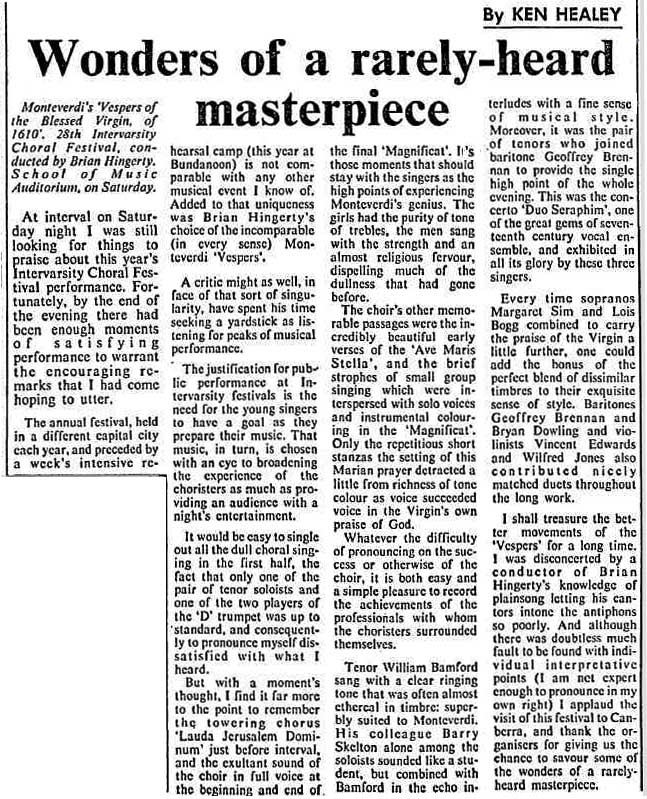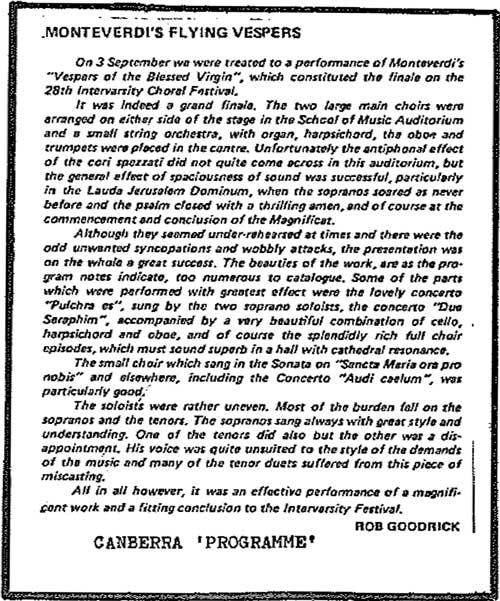

SCUNA history » IVs and Minifests hosted by SCUNA to 1988 » 1977 IV » Reviews of main concert

Monteverdi's 'Vespers of the Blessed Virgin, of 1610'. 2Sth Intervarsity Choral Festival, conducted by Brian Hingerty. School of Music Auditorium, on Saturday.
At interval on Saturday night I was still looking for things to praise about this year's Intervarsity Choral Festival performance. Fortunately, by the end of the evening there had been enough moments of satisfying performance to warrant the encouraging remarks that I had come hoping to utter.
The annual festival, held in a different capital city each year, and preceded by a week's intensive rehearsal camp (this year at Bundanoon) is not comparable with any other musical event I know of. Added to that uniqueness was Brian Hingerty's choice of the incomparable (in every sense) Monteverdi 'Vespers'.
A critic might as well, in face of that sort of singularity, have spent his time seeking a yardstick as listening for peaks of musical performance.
The justification for public performance at Intervarsity festivals is the need for the young singers to have a goal as they prepare their music. That music, in turn, is chosen with an eye to broadening the experience of the choristers as much as providing an audience with a night's entertainment.
It would be easy to single out all the dull choral singing in the first half, the fact that only one of the pair of tenor soloists and one of the two players of the 'D' trumpet was up to standard, and consequently to pronounce myself dissatisfied with what I heard.
But with a moment's thought, I find it far more to the point to remember the towering chorus 'Lauda Jerusalem Dominum' just before interval, and the exultant sound of the choir in full voice at the beginning and end of the final 'Magnificat'. It's those moments that should stay with the singers as the high points of experiencing Monteverdi's genius. The girls had the purity of tone of trebles, the men sang with the strength and an almost religious fervour, dispelling much of the dullness that had gone before.
The choir's other memorable passages were the incredibly beautiful early verses of the 'Ave Maris Stella', and the brief strophes of small group singing which were interspersed with solo voices and instrumental colouring in the 'Magnificat'. Only the repetitious short stanzas the setting of this Marian prayer detracted a little from richness of tone colour as voice succeeded voice in the Virgin's own praise of God.
Whatever the difficulty of pronouncing on the success or otherwise of the choir, it is both easy and a simple pleasure to record the achievements of the professionals with whom the choristers surrounded themselves.
Tenor William Bamford sang with a clear ringing tone that was often almost ethereal in timbre: superbly suited to Monteverdi. His colleague Barry Skelton alone among the soloists sounded like a student, but combined with Bamford in the echo interludes with a fine sense of musical style. Moreover, it was the pair of tenors who joined baritone Geoffrey Brennan to provide the single high point of the whole evening. This was the concerto 'Duo Seraphim', one of the great gems of seventeenth century vocal ensemble, and exhibited in all its glory by these three singers.
Every time sopranos Margaret Sim and Lois Bogg combined to carry the praise of the Virgin a little further, one could add the bonus of the perfect blend of dissimilar timbres to their exquisite sense of style. Baritones Geoffrey Brennan and Bryan Dowling and violinists Vincent Edwards and Wilfred Jones also contributed nicely matched duets throughout the long work.
I shall treasure the better movements of the 'Vespers' for a long time. I was disconcerted by a conductor of Brian Hingerty's knowledge of plainsong letting his cantors intone the antiphons so poorly. And although there was doubtless much fault to be found with individual interpretative points (I am not expert enough to pronounce in my own right) I applaud the visit of this festival to Canberra, and thank the organisers for giving us the chance to savour some of the wonders of a rarely heard masterpiece.
- Wonders of a rarely-heard masterpiece. (1977, September 5). The Canberra Times (ACT : 1926 - 1995), p. 7.
Retrieved June 21, 2013, from Trove: http://nla.gov.au/nla.news-article110863535

On 3 September we were treated to a performance of Monteverdi's Vespers of the Blessed Virgin, which constituted the finale o[f] the 28th Intervarsity Choral Festival.
It was indeed a grand finale. The two large main choirs were arranged on either side of the stage in the School of Music Auditorium and a small string orchestra, with organ, harpsichord, the oboe and trumpets were placed in the centre. Unfortunately the antiphonal effect of the cori spezzati did not quite come across in this auditorium, but the general effect of spaciousness of sound was successful, particularly in the Lauda Jerusalem Dominum, when the sopranos soared as never before and the psalm closed with a thrilling amen, and of course at the commencement and conclusion of the Magnificat.
Although they seemed under-rehearsed at times and there were the odd unwanted syncopations and wobbly attacks, the presentation was on the whole a great success. The beauties of the work are, as the program notes indicate, too numerous to catalogue. Some of the parts which were performed with great effect were the lovely concerto Pulchra Es, sung by the two soprano soloists, the concerto Duo Seraphim, accompanied by a very beautiful combination of cello, harpsichord and oboe, and of course the splendidly rich full choir episodes, which must sound superb in a hall with cathedral resonance.
The small choir which sang in the Sonata on Sancta Maria ora pro nobis and elsewhere, including the concerto Audi coelum, was particularly good.
The soloists were rather uneven. Most of the burden fell on the sopranos and the tenors. The sopranos sang always with great style and understanding. One of the tenors did also but the other was a disappointment. His voice was quite unsuited to the style of [or?] the demands of the music and many of the tenor duets suffered from this piece of miscasting.
All in all however, it was an effective performance of a magnificent work and a fitting conclusion to the Intervarsity Festival.
- From a publication called Canberra Programme. Source: Erato 27 of February 1978, p9.